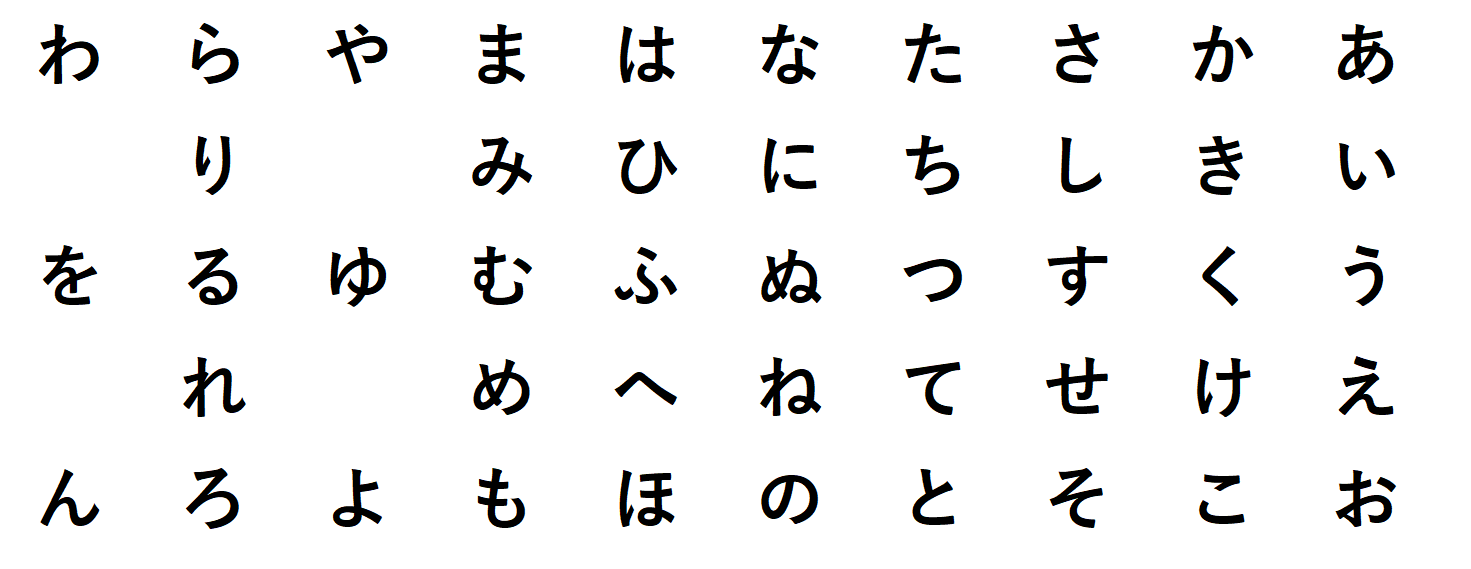First of all, you should know that all Japanese phrases, words, texts, can make using only Hiragana. It consists of 46 words. But 20 words out of 46 words have two types, one is the normal.The other is having the voicing mark.
5 words out of 46 words have two types, one is the normal.
The other is having the p-sounds mark.
Totally Japanese words consist of 71 words.
This is the basic 46 words of hiragana.
| A | I | U | É | O | |
| あ (A) | い (I) | う (U) | え (É) | お (O) | |
| K | か(KA) | き(KI) | く(KU) | け(KÉ) | こ(KO) |
| S | さ(SA) | し(SHI) | す(SU) | せ(SÉ) | そ(SO) |
| T | た(TA) | ち(CHI) | つ(TSU) | て(TÉ) | と(TO) |
| N | な(NA) | に(NI) | ぬ(NU) | ね(NÉ) | の(NO) |
| H | は(HA) | ひ(HI) | ふ(HU) | へ(HÉ) | ほ(HO) |
| M | ま(MA) | み(MI) | む(MU) | め(MÉ) | も(MO) |
| Y | や(YA) | ゆ(YU) | よ(YO) | ||
| R | ら(RA) | り(RI) | る(RU) | れ(RÉ) | ろ(RO) |
| わ(WA) | を(WO) | ん(N) |
The words having the voicing mark.
| A | I | U | É | O | |
| G | が(GA) | ぎ(GI) | ぐ(GU) | げ(GÉ) | ご(GO) |
| Z | ざ(ZA) | じ(JI) | ず(ZU) | ぜ(ZÉ) | ぞ(ZO) |
| D | だ(DA) | ぢ(JI) | づ(ZU) | で(DÉ) | ど(DO) |
| B | ば(BA) | び(BI) | ぶ(BU) | べ(BÉ) | ぼ(BO) |
| P | ぱ(PA) | ぴ(PI) | ぷ(PU) | ぺ(PÉ) | ぽ(PO) |
The words having the P-sounds mark.
| A | I | U | É | O | |
| P | ぱ(PA) | ぴ(PI) | ぷ(PU) | ぺ(PÉ) | ぽ(PO) |
This is all 71 words of hiragana.
| や(YA) | ゆ(YU) | よ(YO) |
Only this 3words can be small size. And It`s able to make the different words by combine with 8 words at the bottom.
| き(KI) | し(SHI) | り(LI) | ||
| ぎ(GI) | じ(JI) | み(MI) | ||
| び(BI) | ぴ(PI) |
The words combine with its.
| A | U | O | |
| KY | きゃ(KYA) | きゅ(KYU) | きょ(KYO) |
| SH | しゃ(SHA) | しゅ(SHU) | しょ(SHO) |
| RY | りゃ(RYA) | りゅ(RYU) | りょ(RYO) |
| MY | みゃ(MYA) | みゅ(MYU) | みょ(MYO) |
| GY | ぎゃ(GYA) | ぎゅ(GYU) | ぎょ(GYO) |
| JY | じゃ(JYA) | じゅ(JYU) | じょ(JYO) |
| BY | びゃ(BYA) | びゅ(BYU) | びょ(BYO) |
| PY | ぴゃ(PYA) | ぴゅ(PYU) | ぴょ(PYO) |
Special pronunciation of hiragana.
| っ(TSU) | ー |
っ(small TSU) is a pronunciation called a double consonant.
For example, なつ(NATSU) mean summer, but なっつ(NATTSU) mean nuts.
And ー is macron.
For example, こーひー(KO-HI-) mean coffee.
Making the words need to combine different parts of its. Like alphabets.
For example,
| わ(WA) | た(TA) | し(SHI) |
| あ(A) | な(NA) | た(TA) |
わたし(WA TA SHI) mean I,my,me
あなた(A NA TA) mean you,your
It`s very simple.
If you memorize all words, you can read Japanese texts written ひらがな (Hiragana).
きょう、わたしはにほんごをべんきょうしました。 ひらがなをつかったぶんしょうであればよむことができます。
Can you read it? I will teach you the right answer and meaning in the next lesson.
That`s all for today. Thank you for watching my site,sayonara!!!

COMMENTS